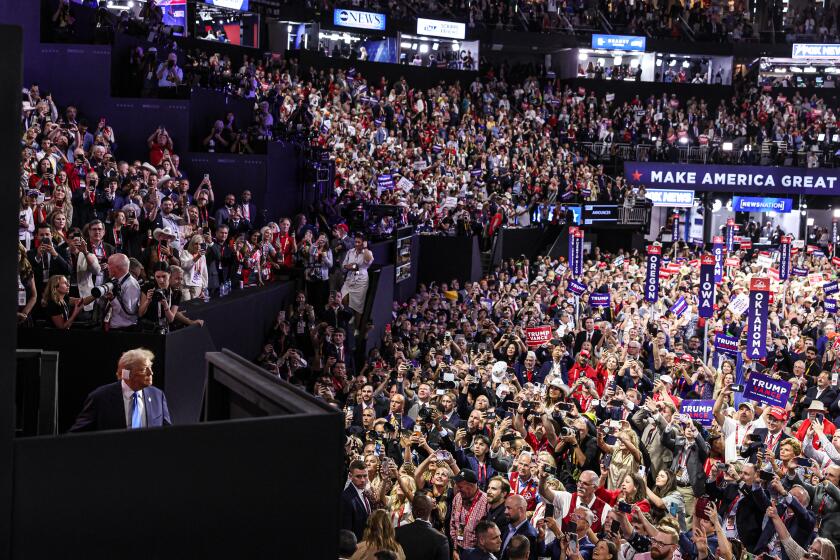George Takes Oath as Supreme Court Justice
Appellate Justice Ronald Marc George, saying judges should refrain from imposing their own “social and economic” views in their decisions, was sworn in Tuesday as the newest member of the California Supreme Court.
George, who in his 19-year trial and appellate career has been named to judgeships by four governors, took the oath of office from Gov. Pete Wilson immediately after he was confirmed here by the state Judicial Appointments Commission.
“At the risk of being immodest, I don’t see how I could have done better,” Wilson said after administering the oath to George, his first high court appointee.
After a one-hour hearing, the new justice’s confirmation came on a unanimous vote of the commission, made up of Chief Justice Malcolm M. Lucas, state Atty. Gen. Dan Lungren and Appellate Justice Lester W. Roth of Los Angeles, the senior presiding justice of the state Courts of Appeal.
George, 51, of Los Angeles, succeeds Justice Allen E. Broussard, 62, who retired from the high court last week. The new member will sit with the court for the first time next week, when the justices hear arguments in San Francisco on a series of cases, including the constitutionality of Proposition 140, the legislative term limitation measure passed by the voters last fall.
A former state prosecutor and advocate of judicial restraint, George is expected to further solidify the conservative majority that has led the court since the election defeat of Chief Justice Rose Elizabeth Bird and two other liberals in November, 1986.
The departure of Broussard left the court with only one other recognized liberal, Justice Stanley Mosk, an appointee of former Democratic Gov. Edmund G. Brown Sr. George, the choice of Republican Wilson, joins five generally moderate-to-conservative members selected by former Gov. George Deukmejian, a Republican.
In Tuesday’s hourlong confirmation hearing, George drew few questions from the commission and offered only generalized insight into his judicial philosophy. Answering an inquiry by Lungren, George cited the importance of following judicial precedent and of deferring to other branches of government in deciding cases. It was up to the Legislature to make the laws and the courts to interpret the laws, George said, “not to legislate one’s own social and economic views.”
Patrick R. Dixon, chairman of a State Bar commission that evaluates judicial nominees, reported that the group had found George “exceptionally well-regarded” in the legal community, and that as a judge he had performed with “extraordinary superiority.”
George also won praise from a series of five witnesses--all current or former judges--who testified in his support. One of the witnesses, retired state Supreme Court Justice John A. Arguelles, noted that George had scored a “judicial grand slam” by winning court nominations from four governors.
George was named to the Los Angeles Municipal Court by Gov. Ronald Reagan in 1972, the Los Angeles Superior Court by Gov. Edmund G. (Jerry) Brown Jr. in 1977, and the state Court of Appeal in Los Angeles by Deukmejian in 1987. Wilson announced George as his pick for the high court last July.
As a Superior Court judge, George presided over one of the longest criminal trials in U. S. history--the two-year, two-day “Hillside Strangler” case, which resulted in the conviction of Angelo Buono Jr. for the murders of nine women in 1977 and 1978.
Only one witness urged the commission to reject the nomination. June McGee, a Pasadena attorney, accused George of failing to recognize her client’s constitutional rights in an insurance dispute before the Court of Appeal. Questioned by Lucas, McGee conceded that two other members of the panel had joined George in ruling against her, and that she had been fined $1,000 for filing a “frivolous” appeal in the case.
George also was subject to a report by the attorney general’s office that was made available to reporters at the hearing. The report, based on confidential interviews with 11 unnamed individuals, gave George high marks for ability, temperament and integrity. However, one person interviewed described the nominee as “result-oriented” toward the prosecution and another said he had a “tendency to be ideological” in his rulings.
More to Read
Sign up for Essential California
The most important California stories and recommendations in your inbox every morning.
You may occasionally receive promotional content from the Los Angeles Times.






